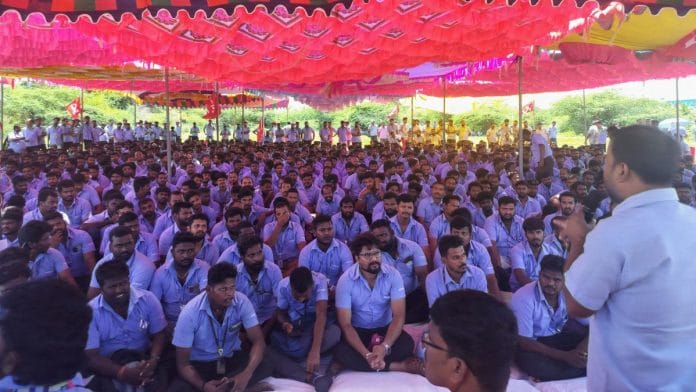Chennai: On 8 July this year, complaining of poor wages, long working hours and humiliation by the management, employees of the Tamil Nadu unit of Samsung Electronics decided to form a union with the help of the Centre of Indian Trade Unions (CITU). At the first general body meeting of the Samsung India Workers’ Union (SIWU), members raised their demands through a resolution and expressed solidarity with thousands of their South Korean colleagues who were leading an indefinite strike against the tech giant for similar reasons.
Nearly two months later, 1,000 workers of the multinational company’s manufacturing unit in Tamil Nadu’s Sriperumbudur, nearly 50km from Chennai, took to the streets, demanding, among other things, the recognition of their union.
The strike, which began on 9 September, has now entered its fourth week, with the workers refusing to return to work till their demands are met. Their main demand is instant approval of their proposal to form a union—which striking workers say has been pending before the Tamil Nadu labour department since 25 July.
On Tuesday, the Tamil Nadu Police detained nearly 900 workers for organising a street protest near the factory and “causing public inconvenience”, senior state police officer Charles Sam Rajadurai said.
A. Soundararajan, state president of the Communist Party of India (Marxist)-linked CITU and a former CPI(M) MLA, alleged Thursday that the Dravida Munnetra Kazhagam (DMK)-led Tamil Nadu government has been colluding with the management to delay the registration of the union. He said the police had detained hundreds of workers on 19 September, hours before a planned demonstration in Kancheepuram district’s Theradi.
L. Ramesh, joint commissioner at the Tamil Nadu Labour Welfare Department, who is handling the registration application, refused ThePrint’s request for comment.
However, a source at the department, on condition of anonymity, told ThePrint that the dispute has emerged as Samsung management didn’t want its name associated with a trade union.
“The joint commissioner should process the application by now. That is the usual norm. But we don’t know why he is sitting on it,” the official told ThePrint.
Under the Trade Unions Act of 1926, all applications for the registration of trade unions should be made to the Registrar of Trade Unions and should be verified by the labour department within two working days.
Meanwhile, a Samsung India official told ThePrint that the company is willing to negotiate over the wages and other demands with the striking workers but not with a CITU-affiliated union.
“We have a structure internally and there is a workers’ council. However, the protesting employees wanted to bring the CITU to the company. We are not willing to recognise that,” the official told ThePrint. When asked if the company was willing to accept the unionisation of its workers, the official did not respond.
A Samsung India spokesperson denied allegations that the workers were mistreated, said they were paid better than their peers at other firms in the region and that many had been with the company for more than a decade.
Also Read: DMK trains guns at Centre over ‘promised’ funds for Chennai metro. Stalin seeks Modi’s intervention
Production near normal: Samsung India
Headquartered in Samsung Digital City, some 20 km south of Seoul, the capital of South Korea, the manufacturing conglomerate started manufacturing in India from Noida in 1996, following the liberalisation policies introduced by the Narasimha Rao government.
The company’s second manufacturing unit in India, for the production of LCD TVs, washing machines and colour monitors, was inaugurated in Chennai in 2007.
In 2022, Samsung invested Rs 1,588 crore to set up a new compressor manufacturing facility spread over 22 acres in Sriperumbudur with the capacity to produce 8 million units a year and plans to expand it in future.
The company currently employs a workforce of 1,800 in Tamil Nadu, of whom over 1,000 workers are on strike.
CITU state chief Soundararajan said the protest is getting huge support from the workers of neighbouring industrial units in the area.
“Every day, Rs 55,000 is needed for providing lunch for the 1,500 workers. It’s provided by workers of other companies like Hyundai, Apollo tyres, etc,” he said.
The leader added that the labour department held three discussions with the protesters and Samsung but failed to reach any understanding as the company maintained that it wouldn’t accept the union, formed with the support of the CITU.
He said 1,500 workers approached the CITU in June this year to help them form the union as they were fed up with alleged mistreatment by the management.
Samsung India denied this allegation.
The Samsung India spokesperson told ThePrint that the average monthly salary of a full-time manufacturing worker at the Chennai plant is 1.8 times the average salary of workers employed in similar work at other companies in the region.
“Our workers are also eligible for overtime pay and other allowances and we provide a workplace environment that assures the highest standards of health, safety and welfare, including free shuttle bus and meals.” the spokesperson said.
“In addition, at our Chennai factory, full-time employees make up more than the majority of our total workforce, which we believe is the highest level compared with other manufacturers in the region.”
According to the spokesperson, many of the employees have been with the company for over a decade. The company said it has informed the striking workers that they will not be paid for the duration of the strike under their ‘No Work, No Pay’ policy.
“When our workers took this extreme step, we were taken by surprise. We suffered 50 per cent production loss on the first day,” the first Samsung official quoted above told ThePrint adding that the company was able to gradually increase the production after hiring staff from other departments. He said the production has now returned to “near normalcy”.
(Edited by Sanya Mathur)
Also Read: These Chennai IT professionals are after invasive fish—want them out of India’s lakes






